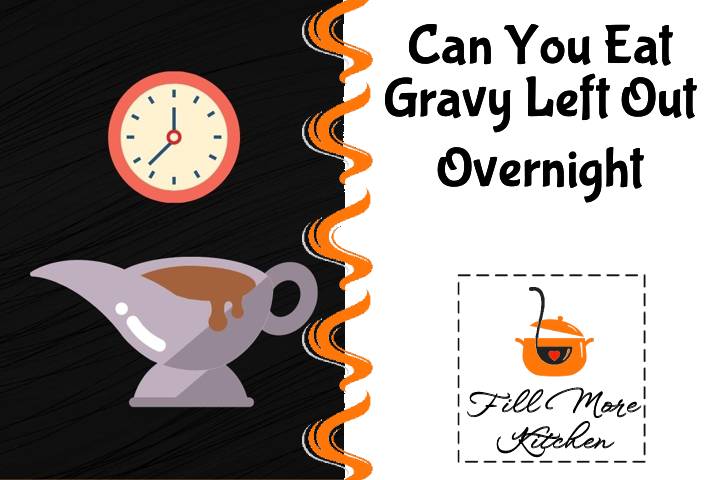Many beloved southern dishes, like mashed potatoes and chicken fried steak, are often served with gravy. Homemade gravy is especially delicious and difficult to surpass.
If gravy is left out overnight, it is not safe to eat and should be discarded. Even if there are no visible signs of mold growth, the gravy may contain harmful bacteria that can cause illness.
However, if your gravy was left out for a short period, it may be difficult to determine whether it has spoiled or not. Keep reading to discover the dos and don’ts.
How Long Can You Leave Gravy at Room Temperature?
It is not safe to leave gravy unrefrigerated for more than two hours as it is a perishable food, and beyond this time, it should be discarded, and a fresh batch should be made.
Leaving gravy at room temperature for an extended period of time can lead to a higher risk of bacterial growth, which may result in food poisoning. It is advisable to refrigerate leftover gravy after using it as a condiment for your festive meal, so that you can enjoy it with your leftovers later.
If you want to avoid the two-hour limit, you can maintain the temperature of the gravy by keeping it on low heat on the stovetop. This will prevent it from cooling down to room temperature and allow individuals to serve themselves whenever they desire.
Before storing your gravy in the refrigerator, it is advisable to allow it to cool down first. This is because putting a hot container in the fridge can increase the temperature inside and have adverse effects on other leftover foods.
It is important to cool the gravy for about 30 minutes before refrigerating it to avoid wasting a good batch.
What Happens If You Eat Gravy That’s Gone Bad?
Regrettably, ingesting spoiled gravy can lead to a case of foodborne illness. Nonetheless, medical attention is not always necessary and can typically be managed at home with non-prescription drugs and ample rest.
After consuming contaminated food, symptoms like nausea, vomiting, and fever may not appear right away but can manifest within a few hours. Vomiting is a natural response of the body to eliminate harmful bacteria and promote recovery.
One of the more frequent food-borne illnesses associated with gravy is Clostridium pertingens, which can cause diarrhea and abdominal pain. Fortunately, it usually resolves itself within 24 hours, but no one wants to spend a special occasion feeling unwell.
If you don’t get food poisoning, consuming moldy gravy may make you feel sick to your stomach. However, there are several remedies available to alleviate an upset stomach, including consuming a popsicle or sipping on broth.
Before consuming leftover gravy, it is advisable to perform a brief olfactory examination to verify that it has not turned sour. If there are any alarming signs, such as the presence of mold on the surface, it should be discarded. It is never worth taking the chance of eating spoiled food, and once you have experienced food poisoning, you will exercise caution in the future.
How Can You Tell If Gravy Has Gone Bad?
Gravy typically has a dense texture that is ideal for covering your preferred dishes, like mashed potatoes or Thanksgiving turkey, and should possess a consistent hue while being mostly free of lumps.
Although a more liquid consistency of refrigerated gravy does not necessarily indicate that it is unsafe to consume, it could be an indication that the gravy has been stored beyond its optimal freshness and may have gone bad.
If the gravy has become slimy and moldy, it is a sign that it is no longer suitable for consumption, and it should be discarded entirely to avoid any accidental ingestion.
Merely discarding the uppermost layer of gravy is insufficient in ensuring its safety for consumption, as there may be residual microbes that can cause illness even if they are not visibly apparent.
If the gravy emits a sour or rancid odor, it has likely spoiled, and if there is any separation that cannot be mixed back together, it is probably not safe to eat; therefore, it is advisable to rely on your instincts when deciding whether or not to consume leftovers.
It is advisable to discard food if it appears suspicious rather than risking illness and being confined to bed for a couple of days. Taking appropriate precautions while handling leftovers can safeguard your well-being.
How Should Gravy Be Stored?
Just like other foods, it is recommended to store gravy in a sealed container in the fridge to prevent mold growth and color changes.
Although refrigeration can delay the growth of bacteria, it cannot stop it completely. It is important to monitor your leftovers and consume them before they start to deteriorate and exhibit indications of spoilage.
If you need to store your gravy for an extended period, freezing it is a viable option. In most cases, it freezes effectively and can be thawed and reheated when needed.
Homemade gravy is not a frequent accompaniment to meals for most people, but those who do make it may consider making a larger batch to have on hand for future use.
Gravy must not be kept at room temperature for more than two hours, and it is advisable to store it in either the refrigerator or freezer.
If your leftover gravy has thickened after storage, you may need to whisk it while reheating to avoid separation, and if it’s too thick, adding some liquid like broth can help restore its original consistency.
After reheating leftover gravy, you may observe a change in its texture, which can be more noticeable if it was frozen and thawed. However, this is a typical phenomenon, and the flavor should not be affected.
How Long Does Gravy Last?
If you’re keeping your gravy in the refrigerator, it should remain safe to eat for 3 to 4 days. If you opt to freeze it, the gravy can be stored for up to six months, provided that it is properly sealed and protected against freezer burn.
If you make gravy at home, it is understandable that you would want to prevent it from spoiling before you can enjoy the leftovers, so it is worth taking the necessary measures to store and preserve it properly.
If you prepare gravy using flour, it can be stored in the freezer for a maximum of four months. It is recommended to pack it in separate plastic bags to make defrosting easier. This will allow you to defrost only the required amount for serving mashed potatoes during your next meal.
If you plan to freeze gravy or any other food that can spoil, it is important to label the package with a date indicating when it was prepared and frozen. This will help you avoid thawing and eating something that has been stored for an extended period of time.
If you buy pre-made gravy packets, you usually just have to mix them with a liquid. These packets contain additional preservatives, which means they may have a longer shelf life. Nevertheless, they can still spoil and should be checked before eating if they have been stored for an extended period.
You can also check this video about “Can You Eat Gravy Left Out Overnight?”
Check out our top 10 reviews!
Related posts
https://fillmorekitchen.com/can-you-use-an-oven-with-a-broken-heating-element/
https://fillmorekitchen.com/can-you-put-parchment-paper-in-the-microwave-oven/
https://fillmorekitchen.com/why-are-pressure-cooker-handles-made-of-plastic/
https://fillmorekitchen.com/4-ways-to-fix-a-microwave-door-that-wont-open/
https://fillmorekitchen.com/top-12-substitutions-for-apple-cider-vinegar/



